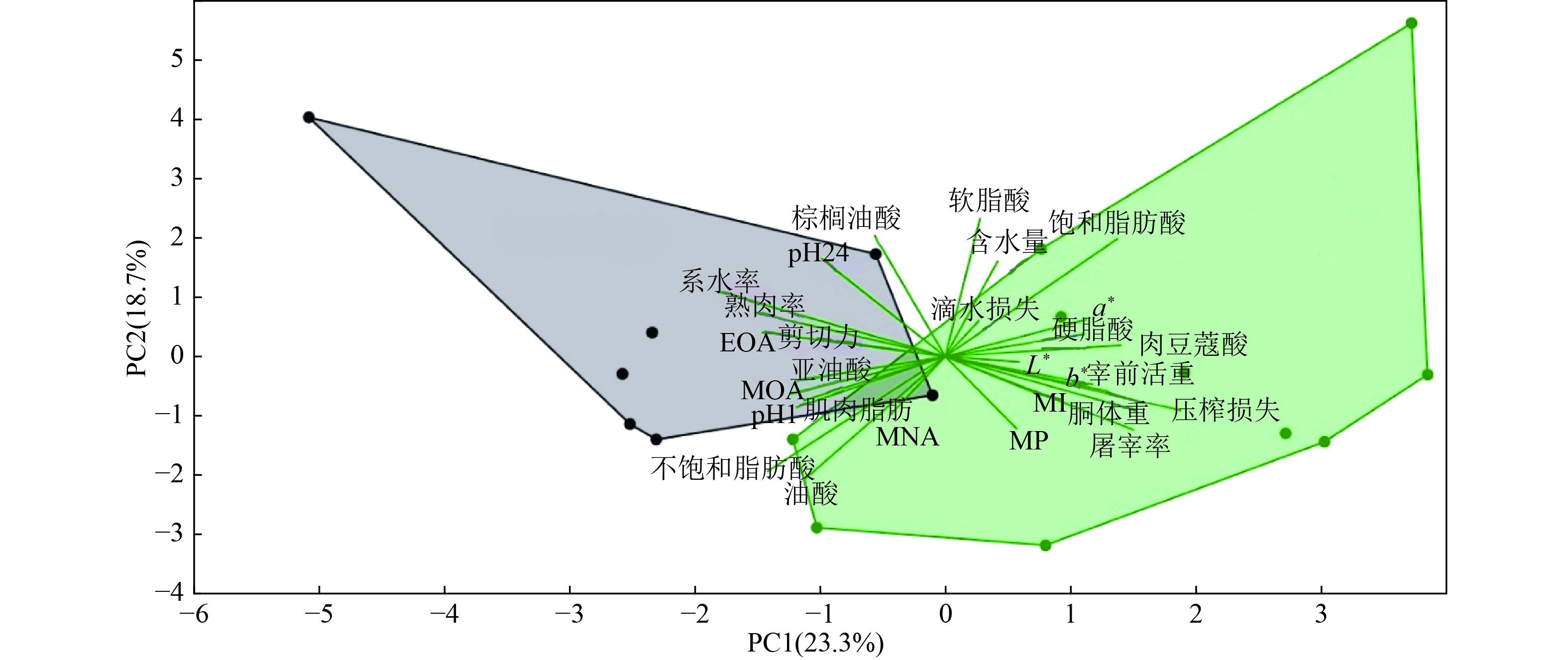| [1] |
马亚晴. 嘉祥小尾寒羊地理标志品牌推广研究[D]. 泰安: 山东农业大学, 2020.
|
| [2] |
Pewan S B, Otto J R, Huerlimann R, et al. Genetics of omega-3 long-chain polyunsaturated fatty acid metabolism and meat eating quality in tattykeel australian white lambs[J]. Genes, 2020, 11(5): 587.
|
| [3] |
|
| [4] |
汤继顺, 朱德建, 陈胜, 等. 澳洲白绵羊与小尾寒羊杂交F1代生产性能分析[J]. 畜牧与兽医,2016,48(9):58−61.
|
| [5] |
|
| [6] |
魏立明, 杨杜录, 郎侠, 等. 澳洲白羊、杜泊羊、萨福克羊与青海高原型藏羊杂交一代羔羊肉用性能与胴体品质测定[J]. 中国草食动物科学,2020,40(3):86−88, 92.
|
| [7] |
Pleasants A B, Thompson J M, Pethick D W. A model relating a function of tenderness, juiciness, flavour and overall liking to the eating quality of sheep meat[J]. Australian Journal of Experimental Agriculture,2005,45(5):483−489. doi: 10.1071/EA04106
|
| [8] |
Erkkila A, de Mello V D F, Riserus U, et al. Dietary fatty acids and cardiovascular disease: An epidemiological approach[J]. Prog Lipid Res,2008,47(3):172−187. doi: 10.1016/j.plipres.2008.01.004
|
| [9] |
Sales-Campos H, de Souza P R, Peghini B C, et al. An overview of the modulatory effects of oleic acid in health and disease[J]. Mini-Reviews in Medicinal Chemistry,2013,13(2):201−210.
|
| [10] |
Kuhnt K, Degen C, Jahreis G. Evaluation of the impact of ruminant trans fatty acids on human health: Important aspects to consider[J]. Crit Rev Food Sci Nutr, 2016, 56(12): 1964-1980.
|
| [11] |
Watkins P J, Kearney G, Rose G, et al. Effect of branched-chain fatty acids, 3-methylindole and 4-methylphenol on consumer sensory scores of grilled lamb meat[J]. Meat Science,2014,96(2):1088−1094.
|
| [12] |
Young O A, Lane G A, Priolo A, et al. Pastoral and species flavour in lambs raised on pasture, lucerne or maize[J]. Journal of the Science of Food and Agriculture,2003,83(2):93−104. doi: 10.1002/jsfa.1282
|
| [13] |
|
| [14] |
韩战强, 刘长春, 李鹏伟, 等. 澳湖、杜湖杂交一代羊育肥效果观察及经济效益分析[J]. 黑龙江畜牧兽医,2018(20):78−79.
|
| [15] |
腾克. 巴美肉羊与小尾寒羊杂交后代产肉性能及羊肉品质的研究[D]. 呼和浩特: 内蒙古农业大学, 2012.
|
| [16] |
Zhang L, Sun B Z, Yu Q L, et al. The breed and sex effect on the carcass size performance and meat quality of Yak in different muscles[J]. Korean J Food Sci Anim Resour 2016, 36(2): 223-229.
|
| [17] |
Khliji S, van de Ven R, Lamb T A, et al. Relationship between consumer ranking of lamb colour and objective measures of colour[J]. Meat Science,2010,85(2):224−229. doi: 10.1016/j.meatsci.2010.01.002
|
| [18] |
Anderson F, Pethick D W, Gardner G E. The correlation of intramuscular fat content between muscles of the lamb carcass and the use of computed tomography to predict intramuscular fat percentage in lambs[J]. Animal,2015,9(7):1239−1249. doi: 10.1017/S175173111500049X
|
| [19] |
Hopkins D L, Hegarty R S, Walker P J, et al. Relationship between animal age, intramuscular fat, cooking loss, pH, shear force and eating quality of aged meat from sheep[J]. Australian Journal of Experimental Agriculture,2006,46(6-7):879−884.
|
| [20] |
Lichtenstein A H. Dietary trans fatty acids and cardiovascular disease risk: Past and present[J]. Current Atherosclerosis Reports,2014,16(8):433.
|
| [21] |
Howes N L, Bekhit A, Burritt D J, et al. Opportunities and implications of pasture-based lamb fattening to enhance the long-chain fatty acid composition in meat[J]. Comprehensive Reviews in Food Science and Food Safety,2015,14(1):22−36. doi: 10.1111/1541-4337.12118
|
| [22] |
Joris P J, Mensink R P. Role of cis-monounsaturated fatty acids in the prevention of coronary heart disease[J]. Current Atherosclerosis Reports , 2016, 18(7): 1−7.
|
| [23] |
Bazinet R P, Chu M W A. Omega-6 polyunsaturated fatty acids: Is a broad cholesterol-lowering health claim appropriate?[J]. Can Med Assoc J, 2014, 186(6): 434−439.
|
| [24] |
Font-i-Furnols M, Guerrero L: Consumer preference, behavior and perception about meat and meat products: An overview[J]. Meat Science, 2014, 98(3): 361−371.
|
| [25] |
Young O A, Berdague J L, Viallon C, et al. Fat-borne volatiles and sheepmeat odour[J]. Meat Science, 1997, 45(2): 183−200.
|
| [26] |
S Kaffarnik, Preuss S, Vetter W. Direct determination of flavor relevant and further branched-chain fatty acids from sheep subcutaneous adipose tissue by gas chromatography with mass spectrometry[J]. Journal of Chromatography A,2014,1350:92−101. doi: 10.1016/j.chroma.2014.05.034
|
| [27] |
Schiller K F, Preuss S, Kaffarnik S, et al. Concentration of three branched-chain fatty acids in adipose tissue does not affect meat sensory traits in crossbred and purebred German “Merinolandschaf ” lambs[J]. Archiv Fur Tierzucht-Archives of Animal Breeding,2015,58:159−163. doi: 10.5194/aab-58-159-2015
|
| [28] |
Sebzalli Y M, Wang X Z. Knowledge discovery from process operational data using PCA and fuzzy clustering[J]. Engineering Applications of Artificial Intelligence 2001, 14(5): 607-616.
|
| [29] |
Caneque V, Perez C, Velasco S, et al. Carcass and meat quality of light lambs using principal component analysis[J]. Meat Science,2004,67(4):595−605. doi: 10.1016/j.meatsci.2004.01.002
|
| [30] |
Hernandez P, Pla M, Oliver M A, Blasco. Relationships between meat quality measurements in rabbits fed with three diets of different fat type and content[J]. Meat Science,2000,55(4):379−384. doi: 10.1016/S0309-1740(99)00163-1
|





 本站查看
本站查看

 DownLoad:
DownLoad: